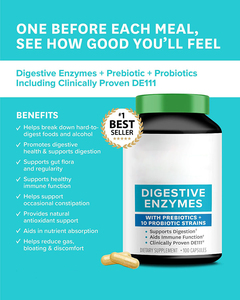Introduction to Infant Digestive Enzymes
Infant digestive enzymes are specialized proteins that play a pivotal role in breaking down food particles in a newborn's digestive system. As infants transition from a liquid diet to solid foods, their digestive systems require additional support to efficiently process nutrients. These enzymes are crucial for maximizing nutrient absorption and preventing digestive discomfort, which can manifest as colic, gas, or constipation.
Understanding the importance of these enzymes is essential for parents and caregivers in promoting gastrointestinal health in infants. They can provide an invaluable resource for those seeking holistic solutions to common feeding challenges and overall digestive wellness.
Types of Infant Digestive Enzymes
- Amylase: This enzyme breaks down carbohydrates into simple sugars. It's essential for infants who are beginning to consume solid foods rich in starches.
- Protease: Responsible for digesting proteins, protease helps in breaking down dairy and meat, making it easier for infants to absorb essential amino acids.
- Lipase: Lipase aids in the digestion of fats, providing vital energy and nutrients through the breakdown of fatty foods.
- Cellulase: This enzyme assists in breaking down the cellulose found in plant fibers, which is beneficial as infants start to explore fruits and vegetables.
Applications of Infant Digestive Enzymes
- Improving Nutrient Absorption: By aiding in the digestion of fats, proteins, and carbohydrates, these enzymes enhance the absorption of essential nutrients that are vital for an infant's growth and development.
- Relieving Digestive Discomfort: Many infants experience common digestive issues like gas or bloating. Digestive enzymes can help alleviate these discomforts by aiding the breakdown of complex food substances.
- Supporting Gut Health: Healthy digestive enzymes can foster a balanced gut microbiome, contributing to overall health and potentially reducing the risk of allergies and food intolerances.
- Facilitating Dietary Transitions: As infants begin to eat more solid foods, digestive enzymes assist in comfortable transitions, allowing their bodies to adapt seamlessly to new diets.
Features and Benefits of Infant Digestive Enzymes
- Natural Ingredients: Many infant digestive enzymes are formulated from natural sources like fruits and vegetables, making them gentle and safe for delicate systems.
- Convenient Forms: Available in drops, powders, and chewable tablets, these enzymes allow easy administration, fitting seamlessly into feeding routines.
- Proven Efficacy: Numerous studies support the effectiveness of digestive enzymes in promoting better digestive health, confirming their role in alleviating common infant ailments.
- Customizable Solutions: Parents can choose enzyme products tailored to their child's specific needs, whether focused on carbohydrates, fats, or proteins, ensuring targeted support.





















































